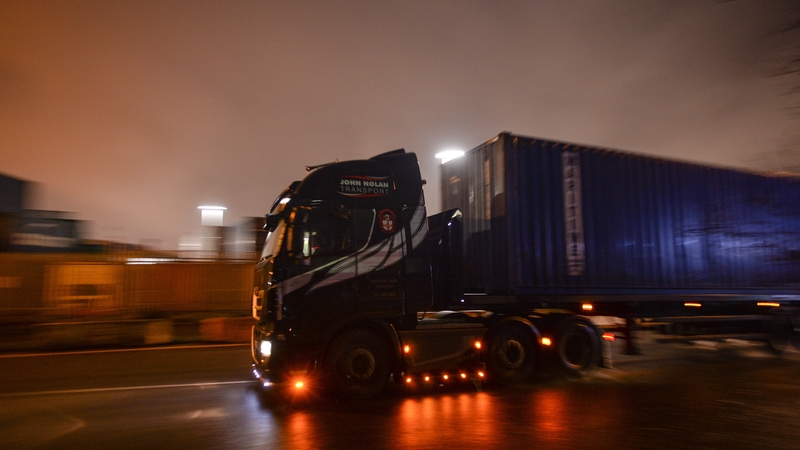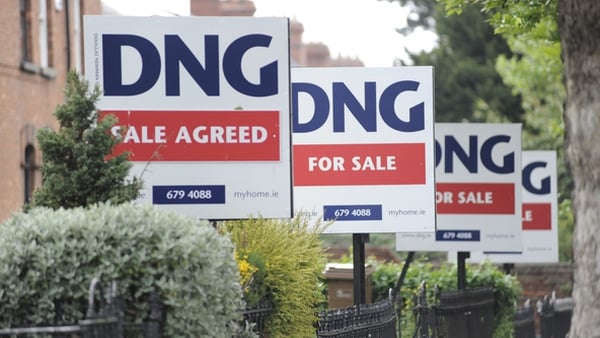Brexit hasn't gone away, you know.
And since midnight, new UK import controls have been in place for goods being sent from the Republic of Ireland to Great Britain.
It is a development that may surprise people who understandably might have thought that at this stage all border controls associated with Brexit would be in place.
But that was not the case.
SO WHY ARE THESE CHANGES HAPPENING NOW?
A few years ago, the Irish Government introduced specific border controls on goods entering Ireland from the UK as part of the post-Brexit changes.
But the UK had not followed suit when it came to Irish imports entering or transiting Britain on the way to continental Europe over the land bridge.
Over the last year or so there had been multiple deadlines set for the introduction of such controls and checks.
But repeatedly they were pushed back again and again, because UK agencies were not ready for the changes.
Finally, in August of last year, the British Government published details of what is called its Border Targeting Model, and set January 31st as the date for implementation.
And now that day has arrived.
HOW BIG A DEAL IS IT FOR IRISH TRADE?
A big enough deal, because Ireland and the UK are still strong trading partners, despite Brexit.
The UK is still the biggest single destination for Irish food, drink and horticulture exports.
47% of Irish beef exports with an estimated value of €1.3 billion go there, for example, while dairy exports to the UK were valued at €1.1 billion in 2023.
So it is important that the introduction of these new rules is as seamless as possible.
That is why in recent weeks the Irish and UK governments had been urging Irish businesses that have not yet thought about this, or prepared for it, to get ready.
SO WHAT ARE THOSE NEW RULES?
There are essentially three things that are changing under the introduction of these import controls.
The first is that full customs controls will be introduced, which means importers in Great Britain or their agents will have to have registered the load coming from Ireland on the UK Customs Declarations System.
Hauliers will need a UK import declaration reference number to generate what’s known as a Goods Movement Reference.
The UK Goods Vehicle Management System will also have to be used to add the import declaration reference and generate the Goods Movement Reference before departing for ports in Ireland.
Then there are also specific requirements when it comes to certain exports, particularly around animals.
Under the new system, exports of live animals from Ireland will have to be pre-notified by the Great Britain based importer to the UK’s food and feed Sanitary and Phytosanitary import system, along with animal products and high and medium risk category plant products.
While Export Health Certificates are required on what are considered medium risk animal products, plants, plant products and high-risk food and feed of non-animal origin.
And so all of that has required businesses to undertake a lot of setting up, registering on UK systems, liaising with UK importers or their agents and with authorities here, like local veterinary inspectors, for example.
IT SOUNDS LIKE A LOT OF WORK. ARE IRISH FIRMS READY?
Irish authorities have been engaging heavily with Irish exporters, logistics providers, ferry operators and others involved in the supply chain in recent months and have run communication and education campaigns.
In general terms, they are confident that awareness and preparedness among medium to large Irish firms is good ahead.
But there has been less confidence that smaller traders are ready as they don’t have the same resources and knowledge.
Overall, because the levels of preparedness are thought to be high, authorities are not expecting long delays at Irish ports from today following the commencement of the new system on January 31st.
But shipments that do not have the required declarations submitted at least 24 hours or more in advance will not be allowed to board ferries.
That could create some problems, although there will be some assistance on hand initially to deal with problems.
It is also expected that the UK authorities will adopt a pragmatic and educational approach to the changes initially, although in the longer term, ongoing consistent or deliberate breaches could result in penalties.
WHAT ABOUT GOODS MOVING NORTH FROM THE SOUTH?
The requirements do not apply to goods that are moving from Ireland to Northern Ireland, while qualifying goods originating in Northern Ireland will continue to have unfettered access to Great Britain.
The rules do apply though both to goods transported directly from Ireland to Great Britain or indirectly via Northern Ireland to Great Britain.
This phase of the rollout is really all around documentation.
But physical checks at Border Control Posts of goods entering Great Britain from the Republic of Ireland will not begin until October 31st at the earliest, although that date has not yet been confirmed






